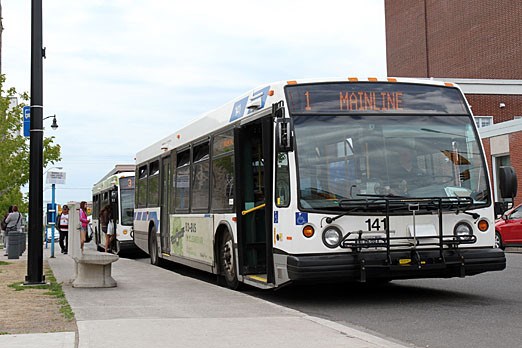THUNDER BAY – Thunder Bay residents will see reduced transit services, after city council approved the measure on a 9-4 vote Monday night. City leaders said the move is necessary due to driver shortages, and to free up resources to address overcrowding on some routes during peak times.
The changes, which go into effect April 5, mean routes will run less frequently and on reduced hours of service, mostly in the evening. All routes, including those which normally do not run on Sundays, will continue operation in at least a limited capacity.
City staff said the changes are meant to respond to an increase in drivers missing work, and to reshuffle resources to respond to changing demand.
Most routes will now run every 45 minutes, rather than every half hour or 15 minutes.
Transit Manager Brad Loroff said ridership had dropped by more than half in recent weeks. Some routes remain busy at peak times, while others have seen declines of up to 80 per cent, he said. Loroff said reducing regular service would free up buses for extra trips on some routes that have remained busy during peak travel times, creating concerns about overcrowding.
City Manager Norm Gale told councillors the city had little choice but to implement the changes, citing increased absences amongst transit drivers as the main reason.
“There’s really no decision to be made here,” said Gale. “We have no choice – we can only deliver what we can deliver with the people we have.”
“We’re no longer able to maintain normal service levels,” said Loroff.
The absences are due to things like illness and bereavement, he said, but that explanation didn’t satisfy some councillors.
“This may sound harsh, but this is a management issue,” said Coun. Andrew Foulds, asking why there would be a sudden jump in regular occurrences like illness and bereavement.
“I suspect there’s something more going on here,” agreed Coun. Mark Bentz, asking whether drivers may be calling in sick over concerns they’re not being adequately protected against the risk of catching COVID-19.
Despite a number of measures taken by the city, some drivers have said they remain worried, calling for the installation of protective barriers.
“Transit drivers would be correct in saying that some routes are seeing crowding issues at some times of the day,” said Loroff, but he maintained the city has taken adequate steps to protect drivers.
“We think we’ve taken actions that are better than plexiglass shields,” he added, saying the city’s restrictions created more than six feet of distance between drivers and riders.
Gale said all divisions of the city are seeing increased absences from employees amid the COVID-19 pandemic.
Other councillors were equally concerned over the safety of riders.
“The bus definitely is a dangerous place to [be]” if not cleaned regularly, worried Coun. Peng You.
Loroff said cleaning had been stepped up substantially, with an extra 30 hours of staff time per day dedicated to the task. He said buses now got a deep clean daily rather than weekly. He added that part of the reason for the driver shortage is that some drivers are being diverted to do that cleaning work.
Coun. Andrew Foulds opposed the service reduction, saying essential workers the city is counting on to get through the crisis, like grocery store workers, depend on transit to get to and from work.
“I just don’t see how this reduction serves those who are serving us,” he said.
Coun. Aldo Ruberto feared reducing hours of service could impact the ability of hospital workers to get to work, pointing out shift changes occur at 7 a.m.. Loroff said while bus service will conclude earlier in the evening under the plan, the city will attempt to start service closer to its normal weekday schedule.
Council approved a plan for reduced service on a split 9-4 vote, with councillors Andrew Foulds, Shelby Ch’ng, Cody Fraser, and Mark Bentz voting against.
The new plan empowers Loroff, the city’s transit manager, to decide exactly what those service reductions will look like. The city argued quickly-changing circumstances made that delegation of authority necessary.
Loroff told council he would seek to maintain early-morning service as much as possible, but that routes would run less frequently and cease service earlier in the evening. He said that would free up some capacity to add more frequent trips at peak times on busier routes, hopefully addressing any overcrowding issues.
He added the changes, which start April 5, will be clearly communicated to residents in the coming days.
